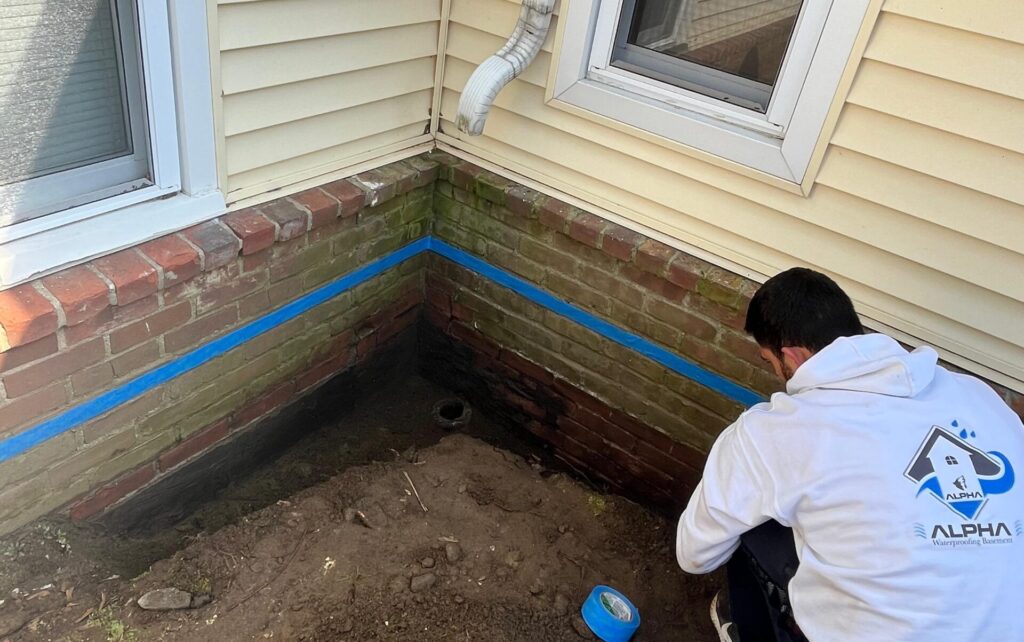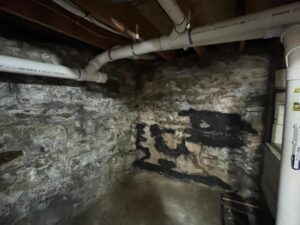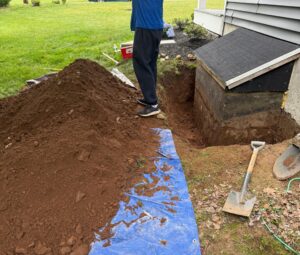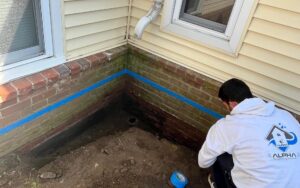Basement waterproofing costs usually start around $1,500 for minor repairs and can reach $12,000 or more for a complete exterior system. The price depends on factors such as basement size, the type of waterproofing (interior vs. exterior), and the severity of the water damage. Most homeowners spend $3,000 to $15,000 on basement waterproofing, which is about $3 to $15 per square foot for a 1,000-square-foot basement.
But here’s the catch: the cost isn’t random.
It all depends on your chosen method: interior waterproofing is like a patch-up job (cheaper, short-term), while exterior waterproofing is a bigger investment (more expensive, but permanent).
Think of it like fixing your phone battery. You can keep charging it every few hours (interior fix), or replace the whole battery so you don’t have to stress about it again (exterior fix).
Cost to Waterproof a 1,000 Sq Ft Basement
Waterproofing a 1,000 sq ft basement can cost very different amounts depending on the source of the water problem and the solution used. Minor moisture issues usually need simple interior treatments, while serious leaks require full drainage or exterior work.
| Cost Range | What You Get | Example Situation |
| $3k–$5k (Budget End) | Sealants, crack injections, and interior drains | Damp walls, light water stains |
| $6k–$10k (Mid-Range) | Full interior drainage with sump pump, partial exterior digging | Small puddles after heavy rain |
| $12k–$15k+ (High End) | Full exterior excavation, new drain tiles, and waterproof membranes | Regular flooding, major cracks |
One of our past customers had a damp basement after every big storm. A $4,500 interior drainage system with a sump pump solved it. Another family ignored leaks until they had standing water.
They ended up needing complete exterior work for $14,000, and now their basement has been dry for over 5 years.
Exterior Basement Waterproofing Cost (The Long-Term Fix)
Exterior waterproofing is what we call the “forever fix.” It prevents water from even touching your walls. However, exterior waterproofing comes at a higher price.
- Average cost: $8,000–$15,000+
- Cost per linear foot: $100–$150
Why so high?
Because it requires excavation, contractors dig around the foundation, install waterproof membranes, add drain tiles, and backfill the soil.
We had a client in a flood-prone area. They first tried a $3k sealant job with another company. Within six months, water was back. They came to us, invested $12,500 in full exterior waterproofing and five years later, their basement is still bone dry.
Interior Basement Waterproofing Cost (The Budget-Friendly Fix)
Interior waterproofing is cheaper and less messy because it controls water once it’s already inside.
- Average cost: $3,000–$8,000
- Cost per linear foot: $40–$85
- Includes: sump pumps, French drains, vapour barriers,and crack sealants.
This is best for dampness and occasional leaks, not for full-on floods.
Pro Tip: If your basement looks like Niagara Falls every time it rains, interior fixes won’t be enough.
Interior vs. Exterior Basement Waterproofing: Which One Should You Choose?
| Interior Waterproofing | Exterior Waterproofing |
| Cost: $3k–$8k | Cost: $8k–$15k+ |
| Manages water after it enters | Stops water before it enters |
| Faster, less invasive | Requires excavation |
| Good for dampness, small leaks | Best for major flooding & long-term value |
Our Take: If you just need to manage moisture or small leaks, interior systems are fine. But if your basement floods regularly, exterior waterproofing is the only true long-term solution.
Common Basement Waterproofing Mistakes
Even pros see these mistakes all the time. Don’t be that homeowner:
Relying only on DIY sealants.
Yeah, slapping on some paint or sealant might stop a leak for a little while but it’s usually just a Band-Aid. Real water problems need real solutions.
Ignoring small leaks.
That tiny drip today? In a few months, it can turn into a full-blown foundation headache. Don’t let it sneak up on you.
Going for the cheapest option blindly.
Just because a fix costs less doesn’t mean it’s actually going to work. Soil, drainage, and foundation condition matter, cutting corners can cost way more later.
Maintenance Tips to Keep Your Basement Dry
Waterproofing isn’t just a one-and-done thing. A little maintenance goes a long way:
- Test your sump pump yearly. Make sure it’s actually pumping; you don’t want a busted pump when the storm hits.
- Keep gutters and downspouts clean. Clogged water channels = pressure on your foundation. Simple cleanup can save thousands.
- Inspect cracks in walls and floors twice a year. Catch problems early before they turn into major leaks.
A few minutes of attention now = a dry basement later.
Final Thoughts
Basement waterproofing isn’t the kind of upgrade you brag about to your friends. But when heavy rain hits, and your basement stays dry, you’ll be glad you invested.
Here’s the truth:
- Interior waterproofing = cheaper, quicker, temporary.
- Exterior waterproofing = pricier, permanent, better for resale.
Water problems don’t fix themselves. Small leaks today turn into big repairs tomorrow.
If you’re not sure which solution is right for your home, we can help. At Alpha Waterproofing & Basement Services, we have seen every type of basement problem, from tiny cracks to full-on floods.
Book a free consultation, and we will give you an honest breakdown of what’s worth your money and what’s not.
People Also Ask
What is the cheapest basement waterproofing method?
Sealants and crack injections, usually $3–$6 per sq ft. Cheap, quick, but only temporary.
Is it worth waterproofing your basement?
Yes. It protects your foundation, prevents mold growth, and boosts your home’s resale value. Ignoring leaks almost always costs more later.
What is the average cost of basement waterproofing?
Most homeowners spend $5,000–$10,000. Interior jobs fall on the lower end, while exterior work often exceeds $15k.






